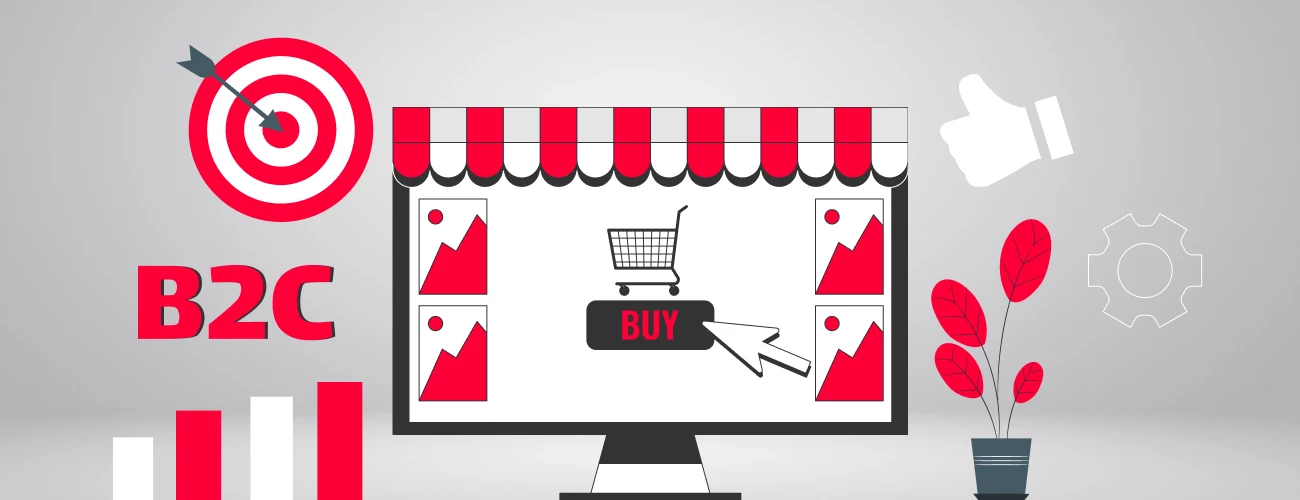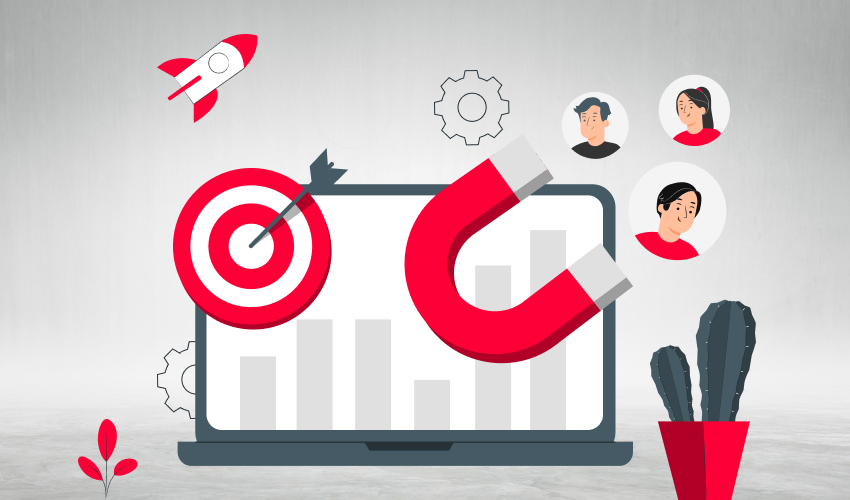B2C e-commerce: the best solutions for customer acquisition

What can be more profitable for a customer than buying goods directly from the manufacturer? Companies take this into account, and use the model of interaction with the end customer as B2C commerce. To the marketing strategy it applies tools that draw the customer's attention to the firm that produces the product, and stimulates to buy.
Thus, the customer gets an opportunity to buy the product/service at the lowest possible price as there are no middlemen in the buy-sell scheme. The manufacturer also benefits from this, as he:
- works directly with the consumer;
- can sell the product at a higher price than wholesale intermediaries who always want to get a discount;
- is able to quickly analyze demand, quickly monitor trends and react to them in time.
Such a direct channel of communication with the customer is called business-to-consumer or B2C-ecommerce.
What is B2C e-commerce
B2C commerce involves the realization of goods not only in production, but also through such channels:
- company stores opened in different locations in a city or country - physical representation;
- online stores (online platforms);
- telephone ordering;
- marketplaces - Rosetka, Prom, Amazon, eBay;
- agents who personally go from client to client and sell goods;
- exhibitions, fairs.
The most effective option is B2C e-commerce, which promotes and sells your product/service through the internet. It allows the customer to conveniently, without leaving home, choose a product in the catalog and order delivery. And this method of selling has many advantages.
Advantages of B2C eCommerce
Modern B2C eCommerce gives special value to businesses compared to other types of B2C:
- 24/7 availability. A customer can buy a product at any time of the day, without being tied to store or merchant hours;
- Wide selection. A well-designed catalog usually contains a full range of products. This includes rare products that are produced in limited quantities and are not available in every physical store. Thus, an online catalog allows you to select and order exactly what the customer is looking for;
- Convenience and time saving. The customer can comfortably browse the catalog, study the offers and order goods without having to leave home, spend time and money on the road;
- Personalization. B2C e-commerce offer tools that show customers products based on their preferences and purchase history.
Another plus is that not having to pay rent for a physical store saves money and can be invested in a new product launch or development.
E-commerce: features and differences between B2C and B2B
B2C e-commerce differs from another similarly named promotion model - B2B (Business-to-Business). In the latter case, it is about selling goods / services to another company, who order them to develop their business.
What is the difference between B2B and B2C, we have shown in the table below:
| B2C commerce | B2B e-commerce | |
| CA (target audience) | Retail customer focus | Cooperation with companies that need the goods for use in their work or for resale |
| Sales volume | In small quantities, but often | Rarely, but in large quantities |
| How the buying decision is made | Fast, emotional, tailored to one's preferences and needs | Can stretch for a couple of months, as the purchase often requires analysis of price, quality, approval in different instances |
| Marketing strategy | It is based on creating a strong emotional connection with the brand by using advertising, social media, etc. | The challenge is to demonstrate the value of the product by providing maximum information. |
| Logistics | Cooperation with popular postal operators, which provides for fast delivery to your home or office | When ordering large quantities, there may be special requirements for shipment, transportation and storage |
| Legal regulation | Subject to laws that are designed to protect consumer rights. Provides for the issuance of a check or receipt for the sale of a good or service. | Focuses on contracts and adherence to commercial agreements between. |
B2C commerce doesn't just work with retail consumers. It focuses on emotion, speed, convenience, quick and frequent transactions to sell a product.
Methods of customer engagement in the B2C e-commerce segment
To interest customers, companies apply different methods of B2C commerce, the task of which is not just to promote the product / service, but also to give an attractive look. The most popular ones are:
- content marketing - creation and distribution of useful and interesting content (blogs, podcasts, presentations, videos, infographics, games), the task of which is to attract and retain the attention of the audience;
- active advertising in social networks. B2C commerce - publishing posts not only on brand pages, but also on famous bloggers;
- targeted advertising (Google Ads and Facebook Ads platforms) - shows the user exactly the product he was interested in when he was browsing the FB feed or typing a query in the Google search bar. This means that if you sell cabinets and a customer was interested in them, they will see your product;
- email marketing. B2C commerce involves sending targeted emails with promotions and news to encourage new and repeat purchases and customer retention;
- creation of personal offers (personalization) - an effective tool offered by B2C commerce. Bonuses, personalized promotions, discounts, loyalty program, individual content attract attention, stimulate to purchase;
- SEO (search engine optimization). Most people search for goods through Google or other search engines. Therefore, special attention should be paid to optimizing your site so that search engines see it and bring it to the top.
Effective B2C commerce involves the use of all these methods. If you do it right, you will attract attention to the brand and push the customer to buy the product.

B2C commerce - effective product solutions
To make B2C eCommerce effective, marketers use different tools. We will talk about the basic solutions for B2C eCommerce that businesses can't do without.
Platforms for B2C
For successful trade, it is necessary to have a website. To create it will help platforms that offer ready-made solutions for B2C commerce to develop online stores (OpenCart, Shopify, WooCommerce, Magento, BigCommerce Wix).
B2C platform allows you to:
- make a user-friendly interface for buyers to easily navigate the site;
- manage the product catalog by adding/removing, editing and sorting products by categories;
- integrate payment systems, providing safe and convenient payment methods for buyers;
- customize shipping and logistics by selecting reliable partners with order fulfillment tracking;
- analyze sales and customer behavior data, gaining critical insights to improve B2C business strategies;
- optimize your website for smartphones, so that your online store is easy to use on any device;
- implement additional marketing and analytical tools to effectively manage online sales.
The price for creating an online store depends on the chosen platform. Basic solutions like OpenCart are a good option for small and medium-sized businesses that have all the necessary tools. For a large online store it is better to choose more complex solutions for B2C commerce - Magento, Shopify, or development from scratch.
CMS
Content Management System is a content management system that serves as an important tool for successful development of B2C commerce (WordPress, Joomla!, Drupal, Magento, Shopify). It allows you to quickly create, edit and manage your website, and does not require deep technical knowledge.
Effective B2C e-commerce using CMS opens up opportunities such as:
- integration with e-commerce platforms;
- editing textual and visual content on the website;
- quick updates of product information, publication of news, including promotions;
- built-in tools for content optimization to improve the visibility of the site for search engines;
- scalability, allowing you to add new features and extensions to the site as your business grows;
- create and work with analytical reports using built-in tools that track user behavior, evaluate the effectiveness of advertising strategies, and make informed decisions;
- integrating with different marketing channels, including social media, email newsletters, and contextual advertising, making them an important element of a comprehensive B2C strategy.
Thus, B2C e-commerce through CMS allows a company to quickly adapt to changes in the market and effectively interact with customers.
Inventory and Order Management Systems (OMS or WMS)
In trade it is important that the right goods are always available, and warehouses are not bursting with surplus of unsold products. Systems that track inventory and work with orders in real-time mode - TradeGecko, Zoho Inventory, ShipStation NetSuite ERP - will help. Their implementation in the company's work allows:
- organize the goods, each having its own place;
- to warn in time that a certain product is running out for timely replenishment of stocks;
- determine where to place a particular batch. Products nearing the end of their shelf life are placed so as to be the first to be sold;
- efficiently process orders, schedule shipments, and handle returned products.
OMS integrates with other B2C tools such as e-commerce platforms, CRM, accounting systems. This makes it easy and hassle-free to manage all business processes.
Mobile apps and PWAs
When planning an advertising strategy, you shouldn't overlook smartphones. Statistics show that more than ⅔ of orders are made through mobile apps and PWA websites, the design and functionality of which is fully customized to the phone.
Among the advantages of ordering via smartphone are:
- the possibility to explore the assortment when there is no access to a PC. This is very convenient if a person is waiting for transportation, standing in a queue, etc.;
- quick access to the store or services directly from the screen of a mobile device;
- regular push-notifications with promotions, news or personalized offers, which promotes active interaction with customers and increases sales.
The price for online store development depends on whether you need only a website or a mobile application. If there is no budget for the latter, a portal developed on the basis of PWA technology is suitable. In this case, the client does not need to download the program to his smartphone, but he can install a shortcut on his desktop and open it at any time.
Product solutions for B2C eCommerce from MEGASITE
B2C commerce requires a well thought-out strategy. The specialists of IT company MEGASITE have been developing digital solutions for effective marketing strategy for more than 10 years. We take an individual approach to each project, using different methods of attracting customers in B2C e-commerce:
- analyze CA and competitors;
- create and customize corporate websites, online stores, mobile applications based on templates and from scratch;
- we are engaged in SEO-promotion, aimed at bringing sites to the TOP;
- customize targeted advertising, email newsletters;
- we carry out complex automation of production, which takes into account the introduction of SRM, OMS and other programs.
We maximally study the needs of the client and offer solutions for B2C commerce, which help to effectively develop business.
Want to create an online store? We invite you to a free consultation at MEGASITE, where we will discuss your project in detail. To do this, leave your request on the website or call us +38 (050) 3986 274.
Your project
Call/write:


